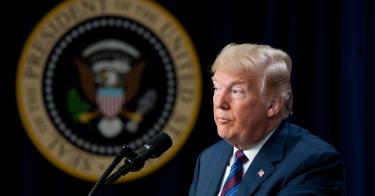On May 24, 2018, the Federal Register's website officially posted proposed reforms to the export controls on firearms and some related items. By and large, the reforms are sensible and welcome — but the 45 day comment period that begins today is also welcome, because not everything in the new rules is on point. In this two part series, I’ll explain the background of the proposed reforms, and then look at their up and down sides.
Export controls are an immensely complicated topic, and if you fall foul of them, you are in a world of hurt. If you are in the firearms business, I urge you to obtain competent legal advice, for which this post is no substitute. I also encourage you to submit polite and constructive comments on the proposed rules individually, through your industry association, or in other ways. It’s important to remember that the goal in commenting is to make what are genuinely intended to be helpful changes even more helpful.
That said, here’s some quick background to help you make sense of these reforms. First, they didn’t originate with the Trump administration. It was the Obama administration that launched export control reform, and which completed 18 of the 21 categories of that reform.
The goal — then and now — was to move things that are not genuinely military off the U.S. Munitions List (the USML, controlled by the State Department) and onto the Commerce Control List (the CCL, controlled by the Commerce Department). The point of that, in turn, was to stop wasting time controlling bolts and truck tires that happened to be part of a weapon, and to focus more energy on controlling things like machine guns and fighter planes. The mantra of export control reform was higher walls around fewer items.
This was a very good idea, and the Obama administration deserves great credit for advancing it. Unhappily, though, they fell down at the last hurdle — or rather, at the first one. For reasons that are universally believed to be political, they never began the public process for the first three categories of the USML, which control small caliber firearms, ammunition, and large caliber guns respectively. I have been told privately many times that the rules for these three categories were ready to go as long ago as 2010, but the Obama administration refused to move them forward because it did not want to appear to be helping the firearms industry. The Trump administration has broken that roadblock.
The Obama administration’s hesitation was foolish because — and this is the second point — these reforms have positively, absolutely nothing to do with the sale of firearms to civilians in the United States, and similarly nothing to do with the permanent import of firearms into the United States for the civilian marketplace. The Bureau of Alcohol, Tobacco, Firearms, and Explosives controls permanent imports of firearms, and nothing about this is changing. Similarly, the State Department is keeping brokering controls for all firearms globally.
Nothing about the proposed rule changes will make it easier to buy a firearm in the United States . If you oppose them on that ground, you are simply opposed to the legal manufacture of firearms in the United States and you might as well come out and say so.
By far the most likely grounds of complaint about these proposed reforms is that, as some commentators have already claimed, the “Trump administration’s policy of increasing arms exports and its attempts to rewrite US arms export regulations and processes, are a scandal” that “will lead to national and international insecurity, and contribute to violations of human rights and international humanitarian law.”
It’s pretty rich for progressives to be complaining about this as though it was all Donald Trump’s idea. The export control reform process began under Obama; his administration presided over an unprecedented growth in U.S. defense exports, and it defended this largely on the grounds that it was a good way to keep high-paying defense jobs in the U.S. In fact, a quick look online will turn up dozens of articles from progressives criticizing Obama on precisely these grounds. For them to turn around now and gripe that this “scandal” began with Donald Trump is ridiculous.
In any event, these complaints are misguided, and based on a misunderstanding of — or ignorance about — what is going on. Even after the proposed reforms come into effect, all export licenses for firearms and related items will still be reviewed for compliance with U.S. conventional arms export policy, treaty requirements, and broader desirability and legality by the Departments of State and Defense. There is nothing unusual about this: all relevant departments can review any export license application for anything at all, from refrigerators to rifles.
In time, State will likely decide it no longer needs to review some firearms exports — such as those to governments of NATO allies. But that is not going to happen for a while, and there is no chance that exports into the civilian market, or outside the circle of the U.S.’s closest democratic allies, are going to be exempt from State review. In short, if you don’t like some (or any) U.S. arms sales, that’s your right, but these reforms are not a decontrol or an escape from State oversight. Blame the decision to sell, if you prefer to, but don’t blame export control reform for it. The simple truth is this: if it needs a license today, it will need a license when controlled by Commerce.
That's the background of the proposed reforms. In my next post, I'll look at their advantages and disadvantages.
This piece originally appeared in Forbes https://www.forbes.com/sites/tedbromund/2018/05/29/trump-administrations-proposed-reforms-to-firearms-export-controls-are-good-mostly/



